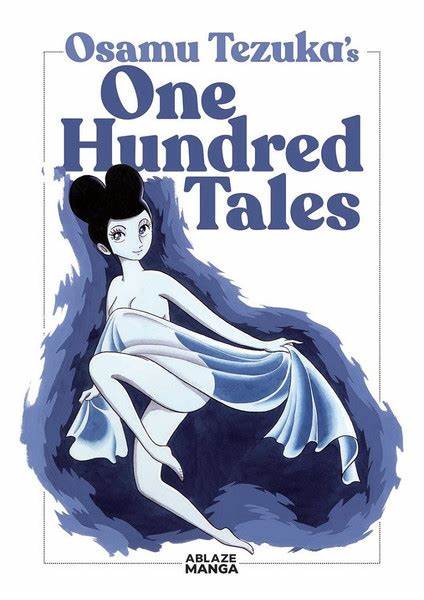Manga Review: One Hundred Tales by Osamu Tezuka
It is the Warring States period of Ancient Japan. Ichirui Hanri, though of the samurai social class, has been an accountant his entire life, never training in combat or lifting a sword. This has not prevented him from getting caught up in a rebellion against the lord, unknowingly delivering money to a conspirator. His protestation of innocence is ignored, and Ichirui is sentenced to seppuku, ritual suicide. He objects to being forced to die when he’s never really even lived, and offers his soul to the black demon depicted on a folding screen if he can be allowed to live.

The black demon is just a painting, but unbeknownst to the humans, there is a real demon lurking nearby. This is the shapeshifter Sudama, who takes the form of a pretty servant girl and interrupts the seppuku ceremony, She offers to not only save Ichirui’s life in exchange for his soul, but grant him three wishes as well! Ichirui wishes to live his life over to his heart’s content, have the world’s most beautiful woman, and rule his own castle and country. Sudama agrees, and the bargain is sealed in blood.
This manga was part of a speculative fiction-themed series of one-shots and short serials redone in the 1970s from stories Osamu Tezuka had originally created in the 1950s, as the market was much more ready for them and he’d grown in skill as a creator. The title is non-indicative as there’s not one hundred tales here, just a Faust-inspired samurai drama. At a guess, the title is from the tradition of telling short ghost stories, blowing out one of a hundred candles as each is finished.
After getting Ichirui away from the place of execution, Sudama takes him to get a complete outward makeover as the handsome youth Fuwa Usoto. But, and this is important, it’s an external transformation. Inside Fuwa is still the weak-willed coward he was before. This causes problems when he looks in on his previous family.
Then it’s time to look at the second wish. Fuwa sees a picture of a very beautiful woman and falls in lust, insisting on meeting her. Unfortunately, the woman in question is Tamamo no Mae, a powerful and evil fox spirit. She despises human men, only valuing them for their delicious life force. Sudama has to bail Fuwa out, but the foxy lady holds a grudge….
Finally getting the hint that he’s been relying too much on Sudama’s magic, Fuwa takes a few years off for self-improvement. He builds strength, endurance, sword skills and self-reliance. The exile ends when a bandit pops up, and Fuwa becomes involved in local politics. It’s time for his final wish, and now Fuwa is taking the lead with Sudama’s support.
The story comes full circle at the end. Fuwa is essentially in the same fix as Ichirui was at the beginning, but instead of being a hapless victim of circumstance, it’s a fate that he has seized. Sudama reminds him that if he’s satisfied with his life, she’ll claim his soul. Is it worth it?
There’s a lot going on here. Family melodrama, fantasy action, political thriller. It all ties together, kind of. Though the story is serious, Tezuka uses a lot of humor in it, with pop culture references like Charles Bronson and Popeye, and cameo appearances by the author.
Ichirui/Fuwa is more protagonist than hero. Though he becomes a better person, his motivations remain essentially selfish, with benefit to others as an okay bonus. Sudama takes larger character development steps from trickster demon to supporter, and both of them come to truly care for each other.
This is a much more Buddhist than Christian interpretation of the Faust legend, so not everyone may feel satisfied by the ending.
Content note: Both fantasy and samurai violence, usually lethal, sometimes gory. Female nudity of the “barbie doll” type. What is essentially sexual assault. Suicide. Fuwa is willing to have extramarital sex though it’s unclear if he ever actually does. Lookism. Older teens should be able to handle this.
This isn’t one of Tezuka’s masterpieces, but is very good of its type, and contained in one short volume. Recommended to fantasy and Tezuka fans.

